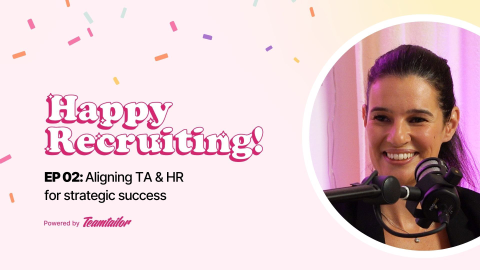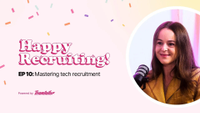Aligning TA and HR for strategic success

We sat down with Raquel Inacio, Head of Talent Acquisition at Normative to discuss the collaboration between Talent Acquisition and HR, and how the lack of one could be having an impact on your business overall.

Valentina Behrouzi
I'm Val, one of the Marketing Managers here at Teamtailor, responsible for our Global marketing. I love talking about candidate experience and how we can strive to make hiring more inclusive.
What strategic benefits are there to this collaboration?
One of the most important things to note in this discussion is that when strategic areas of the business are aligned, such as HR and Talent Acquisition, it also means that all parties have the same goals and the same outcomes, which is beneficial for the organization as a whole.
Oftentimes, a lot of teams within an organization can tend to be siloed, working alongside each other but not necessarily together. A recruiter should have a very holistic view of what’s happening in the company so they’re not just blindingly filling roles, but they have an idea of the bigger picture and future goals so they can fill those roles successfully and increase retention.
Who should be involved?
It’s recommended to determine who the decision makers are early on and make sure you’re all on the same page as soon as possible. This isn’t just limited to TA and HR, but is recommended to get finance involved as well. The reason being that, essentially, they hold the purse strings.
Having regular catch ups with HR and finance means that you’re able to get an idea of where your organization is both in terms of its goals and its budgets, which will therefore guarantee that you’re giving your candidates the correct information and can make more strategic decisions based on those factors.
A tip from Raquel is to assume that nobody knows anything or that no one has talked to each other, so that you can ensure that not only does everyone have all the information that they need, but that it is the same information across the board.
How is candidate experience affected by this lack of collaboration?
As with everything, the way you treat your candidates should be at the top of your priority list in all aspects of your recruitment. Raquel mentions a time early in her career where she offered a role to a candidate and found out later on a catch up with her HR partner that the role had actually been pulled, meaning she had to go back to the candidate and rescind the offer.
It was a mistake she only made once as she made sure communication with her internal stakeholders was consistent and frequent from that moment on. An experience like this can not only be stressful and disappointing for the candidate, but could also affect the reputation of your organization, as we’re more likely to share our negative experiences with our peers than the positive ones.
If everyone involved is consistently on the same page, it will eliminate any miscommunication both internally as well as the information you share with your candidates, creating an overall more positive candidate experience.
Where’s a good place to start building a relationship?
If you’re hiring and you don’t already have a close relationship or consistent communication with decision makers in your organization, it’s important to get this started as soon as possible.
If you already have good rapport, but are just missing the communication part, get weekly catch ups in the diary as soon as you can, even if it’s just 5 minutes every now and then to make sure all the information everyone has still matches up with each other. Making this a regular thing ensures that you’re keeping on top of the organization’s missions, goals and, with finance involved, budgets.
If the rapport isn’t quite there, Raquel suggests starting with that first so that the communication becomes more of a habit. Even if it’s grabbing lunch or a drink once a week, talking about your weekend or something else. Building the relationships will make everything that comes after much easier and a more natural part of your day to day.
Takeaways
To summarize, if you’re not already in regular communication with other internal teams affecting recruitment, then it’s something you should be working on as soon as you possibly can. Build rapport with others in your organization and make sure you’re meeting and sharing information consistently so everyone is on the same page.
Start small if you need to, but remember that this constant communication means you’re avoiding giving your candidates false or misleading information and that you can make your hiring decisions more strategically and efficiently.
Listen to the Happy Recruiting episode to hear more from Raquel as she dives deeper into why the collaboration is important and shares her own experiences from her extensive career in talent and recruitment.
![]()
Mastering tech recruitment
In our latest episode of Happy Recruiting, we spoke with Diana Rose, Talent Acquisition Specialist at Boozt, for an in-depth conversation on tech recruiting. Why is there such a high demand, why is tech recruiting so unique and where does candidate experience come in?
![]()
The perfect phone screening
There are so many ways to screen candidates, both new and old, but the classic phone screen has managed to stand the test of time. We sat down with Kelly Davis, to dive deeper into why it has remained such a pivotal step in the hiring process.
![]()
How to choose an ATS
Choosing an Applicant Tracking is an important decision for a company to make, so we've put together a guide to help you.


